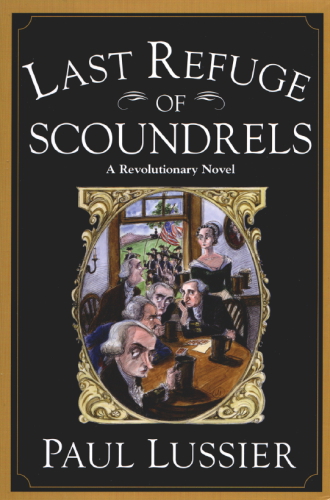
Last Refuge of Scoundrels
A Revolutionary Novel
کتاب های مرتبط
- اطلاعات
- نقد و بررسی
- دیدگاه کاربران
نقد و بررسی

February 5, 2001
The founding fathers of our country are lambasted in this strikingly raunchy account of the Revolutionary War. It seems America's revolution, led by such bumbling, incompetent idiots as John Hancock and Samuel Adams, would never have been possible without the brilliance of a street whore and her star-crossed lover. George Washington lies on his deathbed, terrified of having "lost himself" and being remembered not as George, but as the General. During his last few breaths, he is given a chance to redeem his spirit by recollecting the Revolution as it really was, through the eyes of an "angel," his former aide-de-camp, John Lawrence. John's recollections start in 1765, when this 14-year-old spoiled merchant's son ditches his tutors and roams the streets of Boston, eventually meeting one of John Hancock's whores, 16-year-old Deborah Simpson. The savvy Deborah sees through the hypocrisies of the founding fathers but believes in the truth of the cause. John spends the rest of his life following in Deborah's wake as she ignites the fires of revolution, fighting alongside men, spying for both sides and strategically planning everything from munitions storage to ambush attacks. John and Deborah are present at such historical scenes as the Boston Massacre, the battles at Lexington and Concord, and the Valley Forge horror. They both die unrecognized for their contributions. History, according to Lussier's debut novel, has done us a grand injustice by painting our independence from England as a war of ethics, led by morally upstanding citizens fed up with taxation without representation. Whether his intent is revisionist history or comic satire, Lussier, who formerly wrote for TV and now writes and produces movies for Warner Bros. Studios, certainly takes irreverence to new extremes. History scholars will take umbrage with Lussier's iconoclastic portraits, but general readers tired of present-day politics may find the novel an escapist fantasy.

November 1, 2000
The sacrosanct heroes of the American Revolutionary War are toppled from their pedestals in this irreverent first novel by television writer and producer Lussier. According to John Lawrence, a character based on George Washington's aide-de-camp, the Colonies won their independence through accident, bungling, and the machinations of a whore who really got around. The Founding Fathers are treated with disdain. John Hancock is depicted as silly and vain, John Adams as self-serving, and Samuel Adams as fanatically thuggish. The story is a mishmash of Lawrence's personal travails, salacious encounters, and eyewitness commentaries on historical events. Somehow, he sees it all: the Boston Massacre, the Boston Tea Party, the first Continental Congress, Paul Revere's ride, the battles of Lexington and Concord, and Valley Forge. This makes one wonder whether the first refuge of writers who can't plot is the historical novel. Only mildly amusing and recommended only for large fiction collections.--Sheila Riley, Smithsonian Inst. Libs., Washington, DC
Copyright 2000 Library Journal, LLC Used with permission.

November 15, 2000
In this no-holds-barred revisionist historical novel, the American Revolution is a movement of the people, set in motion and aided in its progress by Deborah Simpson, a whore and spy, with the sometimes-bumbling help of her compatriot-lover, John Lawrence. By contrast, the Founding Fathers--variously described as stupid, vain, fanatic, temperamental, or mad--are gentlemen concerned more with creature comforts, money, and fame and less with the commoners. The "Cause" is all that counts for Deborah, who dresses as a man to fight with the troops or as a woman when it suits her purposes. John, committed first to Deborah and then to the rebels, becomes an aide to the commander-in-chief; and even here, George Washington is portrayed as a brilliant military man, particularly when he turns to the people to win the war. Even laced with a love story, this brisk view of the Revolution, with key characters based on actual figures, is likely to appeal more to readers of history than to readers of fiction.(Reprinted with permission of Booklist, copyright 2000, American Library Association.)

























دیدگاه کاربران